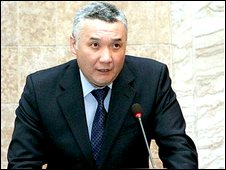
Death Penalty Receives Widespread Political Support in Kyrgyzstan
Publication: Eurasia Daily Monitor Volume: 6 Issue: 210
By:

Debates to renew capital punishment are intensifying in Kyrgyzstan. The idea was first raised last month by the then Secretary of the Security Council Adakhan Madumarov and the Chairman of the National Security Service (SNB) Murat Sutalinov. Then, both officials agreed that capital punishment is the “Kyrgyz” way of dealing with crimes, finding Western recommendations to be irrelevant in the local context. Security officials even mentioned the possibility of public executions (EDM, October 5).
On November 11, the ruling Ak Zhol party ended its support for the U.N. General Assembly’s International Covenant on Civil and Political Rights (ICCPR) that calls for abolishing capital punishment (www.akipress.kg, November 11). The party resorted to a wide range of arguments to justify the death penalty. Kyrgyzstan’s financial inability to support the lives of prisoners serving life sentences that would otherwise be executed was among the most common argument. According to the Kyrgyz Justice Minister Nurlan Tursunkulov, who has a military background, each inmate costs the Kyrgyz government 200 soms per day ($4.60). With about 200 inmates who could be executed, the state is instead spending 1.4 million soms annually (roughly $336,400) to sustain their lives in prison (www.akipress.kg, November 11).
Ak Zhol members of parliament (MP’s) agreed with Tursunkulov’s arguments, claiming that since abolishing the death penalty in Kyrgyzstan, serious crime has became more frequent because criminals know the state will punish them only with “humanity” (www.fergana.ru, November 11). Other arguments included MP’s referring to public opinion polls which, according to them, supported capital punishment. Citing the United States as an example of a country that still allows the measure, also served as an additional factor for Ak Zhol members. Some MP’s questioned the reasoning as to why capital punishment was ever abandoned, since Kyrgyzstan lacks sufficient finances to maintain large numbers of prisoners.
Those supporting ICCPR suggested that the evidence of an increase in the level of crime due to capital punishment being abolished is unconvincing and Kyrgyzstan’s historical and cultural background does not allow such penalties for members of its society (www.akipress.kg, November 11). According to Leila Sydykova another Ak Zhol MP with a background in jurisprudence, capital punishment is not justified in Kyrgyzstan, where over 80 percent of all killings take place in everyday situations, while many others are contract killings. The number of contract killings and violent attacks against political opponents increased after Kurmanbek Bakiyev came to power in March 2005. Overall, five MP’s and a dozen political and criminal opponents of the Bakiyev regime were assassinated. This year alone, seven journalists who criticized the regime were brutally beaten by unknown assailants and subsequently two of them died.
However, the reasoning on both sides fails to resonate with the very principles of ICCPR, which emphasizes the importance of the “inherent dignity of the person” and “every human being’s inherent right to life.” The Kyrgyz politicians’ detachment from these principles testifies to their general misunderstanding of the main reasons as to why the international community has called for abolishing the death penalty.
As one civil society activist from Kyrgyzstan told Jamestown, the current regime is in favor of capital punishment simply to threaten its own adversaries from the political opposition, the criminal underworld, and those deemed to fall under the category of religious extremists. The judicial system in the country is deeply corrupt, with the ruling elite exerting strong influence over the courts. Previous persecution of political opponents on charges of corruption was used mostly as a tactic against those opposed to the government’s attempt to fight corruption. This year the former Foreign Minister Alikbek Jekshenkulov was arrested on allegations of large-scale corruption after he joined the opposition. As the leader of Ata Meken opposition party Omurbek Tekebayev told Jamestown, “the government has a special folder with corruption charges against virtually every politician that can be used when it wants to silence unwanted opposition.”
After several years of the moratorium on capital punishment, it was finally abolished in the constitution adopted in 2007 under the current Bakiyev regime. The initiative to overturn the constitutional statute was abrupt, quickly turning into one of the most widely discussed government initiatives. The parliament is yet to vote on the issue, but it is likely to follow direction from the government and finally support Tursunkulov. While it is difficult to imagine a court decision to execute any of the 200 prisoners currently serving life sentences, potentially the measure is most likely to become an instrument of fear used against opponents of the regime.




